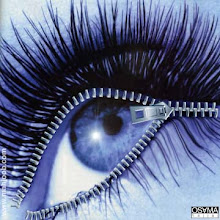
I remember the Leake Street tunnel, near Waterloo, when it was a convenient shortcut to get from the side of the Thames to the Cubana on the other, but it was just as dodgy. The old taxi station, abandoned when the Eurostar moved from Waterloo, smelled like piss, and the presence of the many homeless was all the more accentuated by the trap-like feeling of the tunnel. For a moment both them and I were stuck half-way towards the light. Then I emerged, had a drink and tried to shake off the feeling with some heart-lifting Latin music.
Now the tunnel is one of my favourite spaces in London. There is still a faint whiff of piss lingering but the cigarette and spray-paint smell almost over-powers it, and rather than speeding off towards the comforting other end, I loiter from side to side wishing it would never end. And it doesn't. The changes occur in front of the eyes, new sketches emerge, covering old ones, day after day; depicting, criticizing our world in a cruel and direct way, that seems to be largely absent from any form of media that is poured down our neck minute after minute. Pictures say a thousand words, because the words are ours. We are not told what to think, our mind is shocked by an impression that can trigger thousands of individual interpretations. One of the few things praised by the works is the individual. The thoughts we can think, the love that we make, the changes we can create. But the fear is detectable. You are capable, but what you do with your gift remains a question.
Graffiti is a form of expression (artistic or not, let's not get into it here) that is, through its originally clandestine nature, temporary. Then came Banksy. You think of rats making political statements, you think of kids with balloons flying over the Western Wall, you think of some chick sitting on the Queens face. Banksy made it huge with his talent, and the somewhat elegant style of cruel criticism of basically everything, and because nobody new his face. If he is really Gunningham or not is quite irrelevant. He turned the art of graffiti from illegal destruction into constructive hip.
Banksy makes a load of money. (Or at least I would think so, he published a number of books, and his works are being sold for crazy amounts.) Good on him; his art can be dispersed to an even wider audience, making hopefully more people think. His works haven't seem to lost the piercingly cynical attitude, just look at his recent 'pet shop' in New York, where chicken nuggets eat ketchup, the monkey watches monkey-porn and Tweety still dangles in the cage, some 20 years on. The twisted relationship of man and his animals. Some we dress up, some we eat.
The Cans Festival kicked off sometime in the beginning of May last year. It lasted for three days at the Leake Street tunnel, with large installations and the possibility for the spectators to participate with stencil works of their own. It was a day or two before my Italian orals, but I just couldn't miss it, so I queued for a couple of hours with my quickly purchased Il Resto del Carlino. When I got in finally, in my momentary crowd-spirit I regretted not bringing a camera. Everybody seemed to be taking pictures around me. After a while, it just got very bloody irritating. I couldn't spend time reading, looking, admiring something, because there was always one sucker who, glaring at his digital screen, was flashing around like a maniac. I kept ducking, until I had enough. I emerged on the other side, had a drink and tried to shake off the feeling with some heart-lifting Latin music.
Apparently it was 'hip' to be at the 'Bansky-exhibition'. There was of course a number (countless actually, including the participant turned spectators) other artists involved. But Banksy is famous, he is controversial, we don't know who he is, but I was there, therefore I am cool by association. It is besides the point, that I can't remember anything I saw without looking at my camera.
I need to emphasize, as an enthusiastic amateur photographer myself, that there is nothing wrong with taking a photo, as long as it is a personal interpretation of the world as you see it. When applied in this context, it is the perversion of the concept and intention of graffiti on a number of levels. First and foremost it denies the inherent quality of graffiti as temporal, and therefore destructs its value in leaving an imprint on your mind rather than your camera. The spectator who is asked to be the interpreter remains a spectator, hiding behind a machine, not coming into worthwhile direct visual or emotional contact with the work.
Feel the atmosphere, reflect. Let the work speak to you. Let yourself appreciate what you see, and how it is making you feel. Take a picture if you want. But enjoy it first. It maybe temporal, but it won't disappear in the next 5 minutes. Graffiti is hip, fashionable these days. But it can speak to you through the same clandestine channels about the different ways to see the world as it did decades ago. Just listen.




